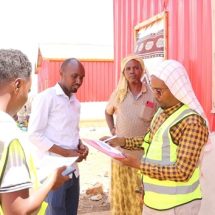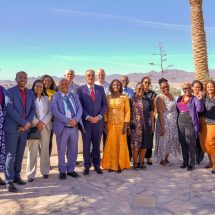 Mbale municipality, Uganda: Involving communities and local leadership in development activities has proven to be an effective way of strengthening relationships between different stakeholders, while implementing community projects. Settlement profiling in Uganda is now embraced as an effective tool for understanding the communities and their needs when interventions are needed. This was clearly expressed in the three- day workshop held in Mbale, Uganda from 3 to5 February, 2014.
Mbale municipality, Uganda: Involving communities and local leadership in development activities has proven to be an effective way of strengthening relationships between different stakeholders, while implementing community projects. Settlement profiling in Uganda is now embraced as an effective tool for understanding the communities and their needs when interventions are needed. This was clearly expressed in the three- day workshop held in Mbale, Uganda from 3 to5 February, 2014.
Addressing the workshop, The Commissioner for Urban Development, Mr Samuel Mabala, challenged the local leadership and communities to be innovative on how to best integrate the settlement in the urbanization process. He added that community experiences are vital in the development.
The workshop aimed at enabling the community to learn by doing, generating a detailed slum inventory and analyzing the data in the Social Tenure Domain Model (STDM) tool. Eventually the whole municipality of Mbale was enumerated and information fed into the STDM tool. The community acquired vast knowledge on STDM as very efficient information and planning tool.
Profiling activities, funded by Cities Alliances, began in 2013, where a total of 15 municipalities will be profiled by the end of 2014. Five municipalities have already been enumerated and the exercise will be replicated in 9 other municipalities in the course of April 2014.
The activities form part of the STDM pilot implementation phase 2, which evolves around the up-scaling and replication of activities beyond the pilot area. STDM was piloted in the Namakwekwe settlement of Mbale municipality. The implementation is a collaborative effort between the Government of Uganda and the Transforming the Settlement of Urban Poor in Uganda (TSUPU) program, ACTogether and the National Slum Dwellers Federation of Uganda (NSDFU), supported by the Ministry of Lands, Housing and Urban Development of Uganda.
Photo by GLTN, Solomon Njogu











